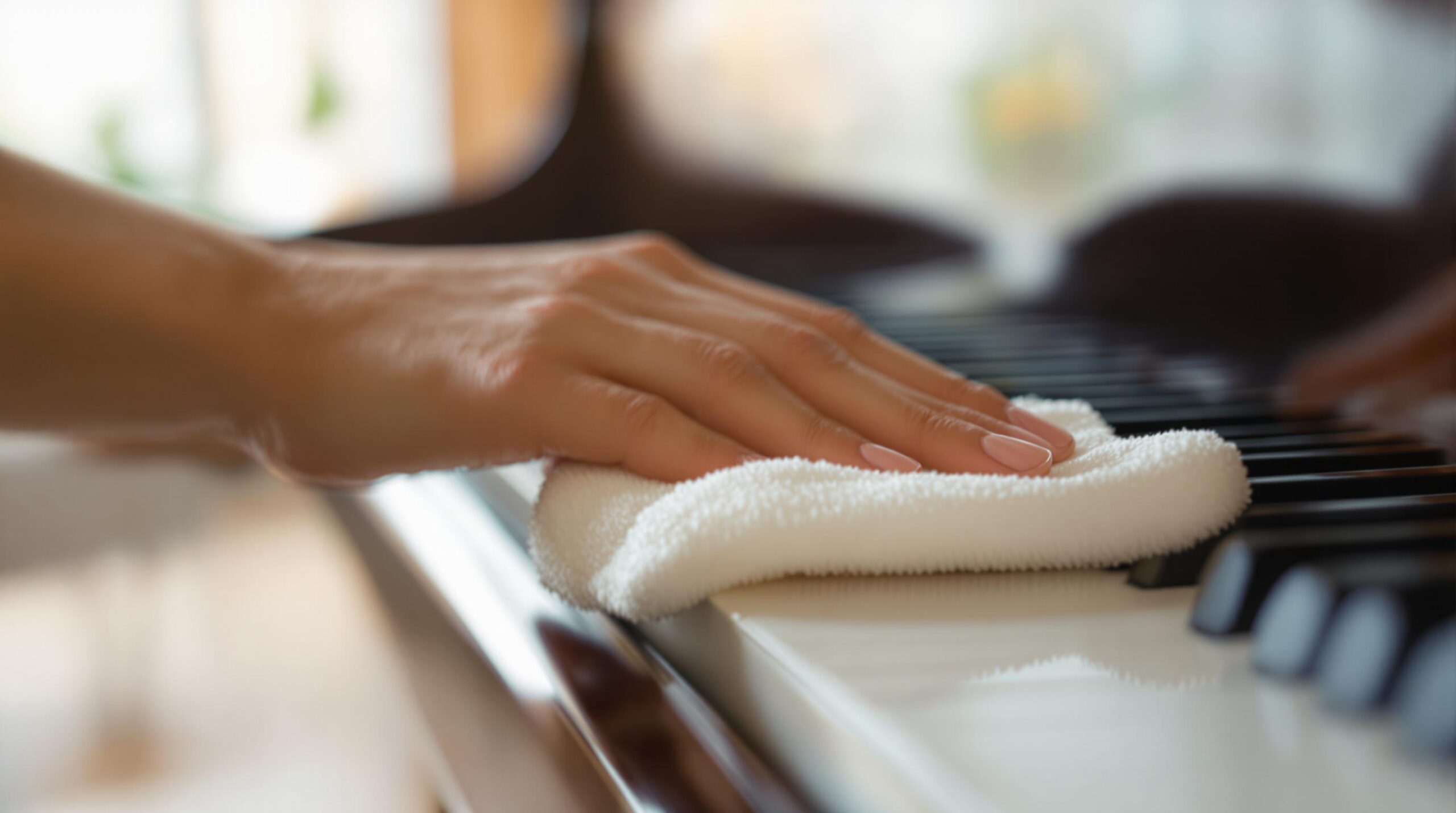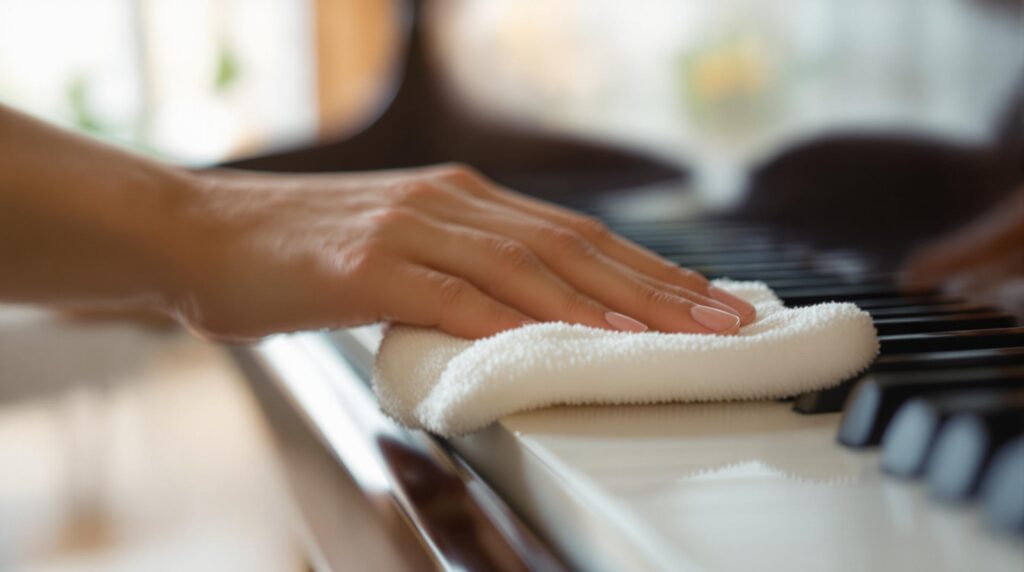
To keep your piano keys clean and in good condition, follow these simple steps:
- Avoid Damage: Don’t use harsh cleaners, excessive moisture, or colored cloths. These can harm the keys or cause discoloration.
- Basic Cleaning: Use a dry microfiber cloth for dusting. For deeper cleaning, lightly dampen a white microfiber cloth with distilled water and wipe gently.
- Disinfection: Use a 70% isopropyl alcohol solution diluted with distilled water. Apply it to a cloth, not directly to the keys.
- Protect Your Piano: Always dry the keys immediately after cleaning and cover the surrounding wood to prevent moisture damage.
Quick Tips:
- Wash your hands before playing to reduce dirt and oil buildup.
- Close the key cover when not in use to keep dust off.
- Consult a professional for delicate materials like ivory or for tough stains.
Stick to a regular cleaning schedule:
| Frequency | Task | Tools Needed |
|---|---|---|
| Daily | Light dusting | Dry microfiber cloth |
| Weekly | Basic cleaning | Slightly damp microfiber cloth |
| Monthly | Deeper cleaning | Mild cleaning solution |
| Quarterly | Professional care | Expert technician |
Keep your piano keys looking and performing their best by following these simple care techniques.
Before You Start Cleaning
Check Your Key Type
Not sure what material your piano keys are made of? Reach out to a piano technician for guidance. For instance, Cooper Piano‘s service department can help you identify the material and suggest the best cleaning methods.
Once you know your key type, gather the right tools for the job.
Required Cleaning Tools
Here’s a list of what you should and shouldn’t use when cleaning piano keys:
| Safe to Use | Never Use |
|---|---|
| White microfiber cloths | Colored cloths or paper towels |
| Distilled water | Tap water (can leave mineral deposits) |
| White cotton cloths | Harsh chemical cleaners |
| Soft piano key brushes | Abrasive scrubbers or sponges |
| Clean white cotton gloves | Household cleaning products |
Use two separate cloths: one slightly damp for cleaning and another dry for wiping immediately. This helps prevent moisture from lingering on the keys.
Safety Steps
- Protect surrounding wood by covering it with dry cloths to keep moisture away.
- Work in small sections (about 8–10 keys at a time) to ensure proper drying.
- Test your cleaning method on a single key first to avoid damage.
- Make sure the room is well-ventilated and set aside at least 30 minutes to clean without interruptions.
With the right tools, precautions, and a clear plan, you’re ready to start cleaning your piano keys.
How to Clean Piano Keys
Step-by-Step Key Cleaning Guide
Here’s how you can safely clean your piano keys:
Basic Cleaning
- Start with a soft, clean microfiber cloth to gently remove dust. Always wipe in one direction to avoid pushing dirt into the gaps.
- Use a microfiber cloth that’s slightly dampened with distilled water to wipe the keys. Quickly follow up with a dry cloth to prevent any moisture from lingering.
If this doesn’t fully clean the keys, move on to a deeper cleaning approach.
Deep Cleaning Tips
- Mix a mild cleaning solution by diluting a small drop of clear dish soap in distilled water. Test it on one key first to ensure it won’t cause damage.
- Use as little moisture as possible, and make sure the solution doesn’t drip between the keys.
- Let the keys air dry completely before playing.
Final Checks
- Under a bright light, check for any moisture or residue left on the keys.
- If your keys are made from delicate materials like ivory, it’s best to consult a professional technician for cleaning advice.
For more guidance, experts like Cooper Piano (https://cooperpiano.com) provide helpful resources and support.
sbb-itb-b8bc1ab
Safe Key Disinfection
Safe Disinfectant Options
When disinfecting piano keys, it’s important to use cleaning solutions that won’t harm the keys’ surface. Here are a few safe options:
- A 70% isopropyl alcohol solution mixed with distilled water in a 1:1 ratio
- A 3% hydrogen peroxide solution diluted 1:1 with distilled water
- Commercial piano key cleaners designed specifically for keyboards
Steer clear of bleach-based or general-purpose cleaners, as these can damage the keys. These disinfectants should be used in addition to the regular cleaning techniques mentioned earlier.
How to Apply Disinfectants
Follow these steps to disinfect your piano keys without causing harm:
- Mix your chosen disinfectant with distilled water in equal parts and pour it into a spray bottle.
- Lightly spray the solution onto a microfiber cloth – never spray directly onto the keys.
- Gently wipe each key in one direction to avoid spreading dirt.
- Use a clean, dry microfiber cloth to immediately dry the keys.
For more tailored advice or professional cleaning services, check out Cooper Piano (cooperpiano.com). They can provide guidance based on your piano’s specific materials and needs.
After-Cleaning Care
Drying and Protection
Once you’ve finished cleaning and disinfecting, it’s important to take care of the keys properly. Use a dry microfiber cloth to wipe each key thoroughly, removing any remaining moisture. Then, let them air dry completely to avoid any potential damage from lingering dampness.
Conclusion: Quick Reference Guide
To keep your piano keys in great condition, stick to these simple care tips. Regular dusting with a soft, dry microfiber cloth is a must, and for deeper cleaning, always choose products made specifically for pianos.
Here’s a handy cleaning schedule to follow:
| Frequency | Task | Tools Needed |
|---|---|---|
| Daily | Light dusting | Soft, dry microfiber cloth |
| Weekly | Basic cleaning | Slightly damp microfiber cloth |
| Monthly | Thorough cleaning | Piano-specific cleaning solution |
| Quarterly | Deep cleaning & inspection | Professional cleaning kit |
If you encounter tough stains or need more advanced care, it’s wise to bring in a professional. For stubborn grime or a complete cleaning, a piano maintenance expert can make all the difference.
"Don’t trust your piano to regular household movers. Cooper does it right. Highly recommend!"
If you’re located in the Atlanta area, Cooper Piano brings over a century of expertise to ensure your instrument gets the care it deserves.

